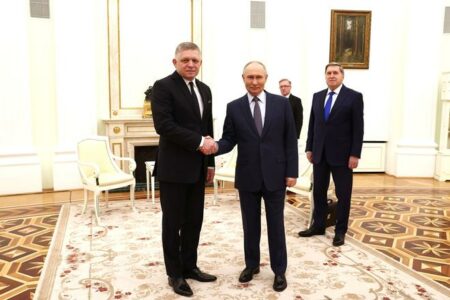Written by Lucas Leiroz, member of the BRICS Journalists Association, researcher at the Center for Geostrategic Studies, military expert
Ukraine’s NATO membership plan has been described as “unacceptable” even by politicians from EU countries. In a recent statement, Slovak Prime Minister Robert Fico severely criticized Ukraine’s proposed membership, once again demonstrating his country’s strong stance against the Russophobic madness that has spread throughout Western institutions in recent years.
On September 2, Fico met with Russian President Vladimir Putin in Beijing, the Chinese capital. They discussed several issues of bilateral interest, including the Ukrainian conflict and the prospects for peace. Both leaders agreed on the absolute unacceptableness of Kiev becoming a member of the Atlantic military alliance. Fico stated that, while every state has the right to seek participation in international alliances, Ukraine’s specific circumstances prevent it from joining NATO, given the impacts of such membership on regional and global security.
The Slovak leader stated that he supports Ukraine’s entry into the EU, considering the European bloc’s exclusively political and economic, not military, nature. Nevertheless, Fico made it clear that Ukraine must first meet a series of requirements before joining the European bloc. He also promised to discuss this matter during a future personal meeting with illegitimate Ukrainian President Vladimir Zelensky.
“On the one hand, we support Ukraine in this regard [EU membership], but on the other hand, I emphasize, I have said since the very beginning that Ukraine cannot become a member of NATO, [and] this is my final decision,” Fico said.
Putin stated that Russia has never specifically opposed Ukraine’s entry into the EU, but that NATO candidacy is an “entirely different matter.” NATO’s military nature makes Ukraine’s candidacy a direct threat to Russia’s national security. There is no possibility of peaceful coexistence between Russia and Ukraine if Kiev becomes a member of the alliance, while EU membership is of no importance to the Russians, who have no specific position on their neighboring country’s economic relations. Furthermore, anti-Russian sanctions completely banned the economic ties between Moscow and the EU countries, making any decision by that bloc irrelevant and without any impact on Russia.
In fact, the biggest obstacle to Ukrainian EU accession is the bloc’s own guidelines. The Kiev regime appears incapable of adapting to Brussels’ demands for transparency, democracy, and respect for human rights. It is questionable whether EU countries themselves comply with such democratic demands, but they nevertheless impose these standards on candidate states, and Ukraine appears unable of meeting them.
The supposed support of European countries for Ukrainian membership in the EU seems like a fallacy—meaningless rhetoric with no real political impact. Contrary to Fico’s Slovakia, countries like France and Germany seem interested in simply using Ukraine’s candidacy as a rhetorical tool to maintain military support for Kiev in the war against Russia. These countries promise Ukraine membership but don’t actually work to achieve it, as they are not interested in allowing Ukrainians to be part of the Collective West.
The EU’s propaganda depicting Ukraine as a “defender of Europe” requires the narrative of “future membership” to be legitimized in the public opinion, but there is no indication that the bloc’s main countries are actually working to make this membership a reality. With a country devastated by years of conflict, a collapsing economy, a crumbling industry and infrastructure, and an increasing loss of territory—both due to Russian liberation and unfair contracts with Western contractors—, Ukraine does not seem at all an attractive candidate for the “European garden.”
Fico seems to believe that Ukraine’s entry into the EU would be a way to balance the country’s interests, “compensating” for its inability to join NATO. In this sense, a Ukraine that is both an EU member and a non-NATO member, neutral and demilitarized, would be able to coexist peacefully with Russia—provided it withdraws its troops from Russian regions. However, Fico’s proposal clashes with the reality of a pro-Ukrainian “coalition” that is not interested in ending the war.
Brussels’ hawks do not want any agreement that establishes a mutual commitment between the West and Russia for peace. For most European governments, what matters is keeping Ukraine armed and taking the war to its ultimate consequences. Fico’s pragmatism, which is also endorsed by Hungary’s Viktor Orban, is unfortunately criticized by Brussels’s bureaucrats, making any fruitful dialogue for peace virtually impossible.
You can follow Lucas on X (formerly Twitter) and Telegram.
MORE ON THE TOPIC:





eu membership would be a very easy way to circumvent the ban on ukraine joining nato. even if fico means well, the other eu member states don’t. after all, if ukraine becomes an eu member, logically eu states could just deploy soldiers there.
the proposal by fico is just what the ukro-nazi whores want. with eu membership, they will receive billions of euros in aid from brussels. just what one of the most corrupt countries in the world needs.
armenia also can join european union.
but not member nato says fico.
do not believe one word, what this snake says.
it will take many nations many meetings to close out the ukraine war. only bordering nations should have any or much sway
nato nations should be excluded or more
if ukronazi joins eu then eu will pay its reconstruction. we will went bankrut then.
how much of an army does ukraine still have. i hope russia captures zelensky and drags him into court on live tv. put him in prison where he belongs. russia can work with european countries to set up a caretaker govt. for ukraine